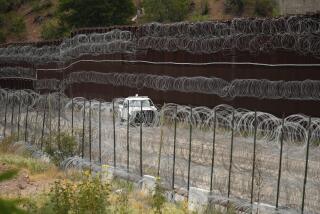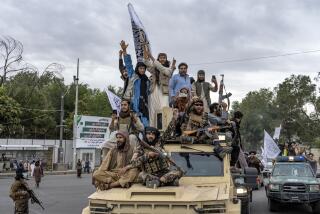New Rules Alarm Diplomats : Embassy Protests Become Close, Unkind Encounters
- Share via
WASHINGTON — Massed outside the Iraqi Embassy’s gate one afternoon last week, several hundred demonstrators besieged the building with chants of “Long Live Khomeini!” It was a raucous display that, during the last 50 years, would have gotten them arrested instantly.
But on this day, as embassy staff members peered angrily out their windows at the spectacle, police just looked on. This demonstration was legal.
As the result of a Supreme Court ruling last week that threw out strict 1937-vintage restrictions on demonstrations in Washington, one of the capital city’s most enduring spectator sports has entered a brash new era.
No longer must demonstrators stay at least 500 feet from the foreign embassies they are confronting, barely within shouting distance. Now protests are close encounters of the most personal, ear-ringing kind.
The change has sent a ripple of alarm through the diplomatic community.
‘Can’t Even Work’
“I don’t like this decision. I can’t even work with all the noise,” one Iraqi Embassy staffer complained as throngs of Iranian protesters rallied just outside her office. “They’re crazy enough far away. Why do they let them have to come so close?”
At other embassies, there already have been angry exchanges between demonstrators and workers, diplomats have had to shout over the commotion in their phone conversations, and security procedures are being reviewed.
“There’s definitely some confusion now,” said an agent with the Secret Service, frustrated with the new rules that he said have made his job tougher. The service plans to meet with local authorities later this week to work out new standards for monitoring protests. But unless a protest poses a clear threat of violence--one exception provided in the high court ruling--there is not much they can do.
With hundreds of interest groups on hand in the city to trumpet myriad causes, and representatives of more than 140 foreign governments providing ripe targets, the possibilities have become positively deafening.
Scene at Ambassador’s Home
Last Thursday night, a scuffle broke out and one man was arrested in a confrontation outside the home of the South Korean ambassador where a reception was under way. (Foreign representatives’ residences are covered by the same rules as embassies.) An egg and a shoe were thrown at a visitor’s car before police intervened.
Over the weekend, protesters broke a window at the Iraqi Embassy and several people were injured during a noisy demonstration over Iraq’s use of chemical weapons in its war with Iran. Earlier, embassy workers hung out makeshift signs that read: “Death to the Devil Khomeini.”
Inside the Soviet Embassy last week, several embassy workers waved their fists angrily at a half-dozen Baltic protesters who were delivering memorial wreaths and denouncing the Soviets’ human rights record.
Staff members at the embassies of the Soviet Union, Israel and South Africa--among the most popular targets of demonstrations--are all bracing for what could be routine mob scenes.
Question of Free Speech
In its ruling, the high court said that the previous buffer zone restrictions amounted to an unconstitutional constraint of freedom of speech. The opinion came in a challenge filed by members of the Conservative Action Foundation who demanded the right to demonstrate outside the Soviet and Nicaraguan embassies.
Members of other political interest groups are relishing the new freedom. To be sure, it now will be difficult to orchestrate the mass arrests that drew extensive news media attention at the South African and other embassies.
However, said Valdis Pavlovskis, a Los Angeles man of Lithuanian descent who took part in a protest last week at the Russian Embassy’s doorstep: “Now, we can confront the Soviets directly. We have a focus that was missing when we had to stay around the corner.”
Police who patrol the demonstrations fear more than voices.
“The officer now finds himself in a predicament with foreign soil to his back and hostile protesters in his face. There’s no neutral zone any more, and that’s a very dangerous situation,” said William Corbett, spokesman for the U.S. Secret Service.
Fear of Retaliation
The State Department said it is concerned that hostile scenes here could lead to retaliation at U.S. embassies abroad. “There’s a real concern we could lose a degree of security” at U.S. missions, said one department official.
For now, the opposing forces are still feeling out the new situation.
More to Read
Sign up for Essential California
The most important California stories and recommendations in your inbox every morning.
You may occasionally receive promotional content from the Los Angeles Times.













